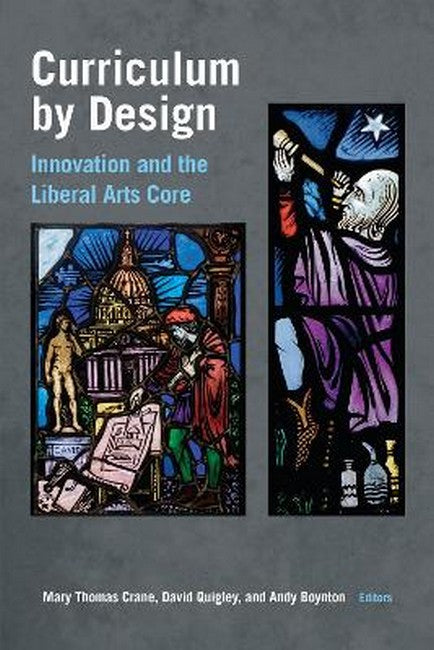Mary Thomas Crane (Edited By) Mary Thomas Crane is the Thomas F. Rattigan Professor of English and director of the Institute for the Liberal Arts at Boston College. She works on early modern English literature and is the author of Framing Authority: Sayings, Self, and Society in Sixteenth-Century England (Princeton University Press, 1993), Shakespeare's Brain: Reading with Cognitive Theory (Princeton University Press, 2000), and Losing Touch with Nature: Literature and the New Science in Sixteenth-Century England (Johns Hopkins University Press, 2014). She has taught the Enduring Question course "Revolutionary Media: How Reading Changes Us." David Quigley (Edited By) David Quigley is the provost and dean of faculties and a professor of history at Boston College. He was previously dean of the Morrissey College of Arts and Sciences at BC. He is the author of Second Founding: New York City, Reconstruction, and the Making of American Democracy (2004). He has taught the Enduring Question course "Worlds of Moby-Dick: What Historical Forces Shape a Book's Greatness." Andy Boynton (Edited By) Andy Boynton is the John and Linda Powers Family Dean of the Carroll School of Management at Boston College. He is the author of The Idea Hunter: How to Find the Best Ideas and Make them Happen and has a blog on leadership and innovation on Forbes .com.
Request Academic Copy
Please copy the ISBN for submitting review copy form
Description
Preface: Curriculum Revision and the Foundations of American Higher Education David Quigley xi PART I: INNOVATION AND THE LIBERAL ARTS CORE 1 Choreographing the Conversation: How Designers Helped Clear an Academic Logjam William Bole 3 What Do We Know? Or, The Perils of Expertise Toby Bottorf 13 Innovation Andy Boynton 21 Ambitious Plans Meet Reality: How We Made the Renewed Core Work Mary Thomas Crane 31 Slowing Down and Opening Up: Preparing Faculty to Co-design a General Education Course Stacy Grooters 41 Core Renewal as Creative Fidelity Gregory Kalscheur, S.J. 50 Reflection and Core Renewal Jack Butler, S.J. 62 Surprised by Conversation: A Reflection on Core Renewal at Boston College Brian D. Robinette 69 PART II: TEACHING THE RENEWED CORE 73 Complex Problem Courses 75 Teaching about a Planet in Peril Prasannan Parthasarathi and Juliet B. Schor 77 Experimenting with Science and Technology in American Society Jenna Tonn 82 Global Implications of Climate Change: Importance of Mentorship in a Core Education Tara Pisani Gareau and Brian J. Gareau 104 Enduring Question Courses: Bringing Together Divergent Disciplines 115 How to Live in the Material World: Two Perspectives Elizabeth Kowaleski Wallace and Dunwei Wang 117 Aesthetic and Spiritual Exercises, in and beyond the Classroom Daniel Callahan and Brian D. Robinette 123 Enduring Question Courses: Differentiating Similar Disciplines 133 Death in Ancient Greece and Modern Russia: Reflecting on Our Reflection Sessions Hanne Eisenfeld and Thomas Epstein 135 Spending a Semester with "A Possession for All Time": Justice and War in Thucydides Robert C. Bartlett 144 Inquiring about Humans and Nature: Creativity, Planning, and Serendipity Holly VandeWall and Min Hyoung Song 150 The Liberal Arts Core: Engaging with Current Events, 2016-2020 157 Crossings: Teaching "Roots and Routes: Reading/Writing Identity, Migration, and Culture" Lynne Anderson and Elizabeth Graver 159 The Architecture of a Black Feminist Classroom: Pedagogical Praxis in "Where #BlackLivesMatter Meets #MeToo" Regine Michelle Jean-Charles 167 Truth-Telling in History and Literature: Constructive Uncertainty Allison Adair and Sylvia Sellers-Garcia 178 Covid Core Lessons Elizabeth H. Shlala 190 Acknowledgments 199 Appendix A: The Vision Animating the Boston College Core Curriculum 203 Appendix B: Boston College Core Curriculum Required Courses 209 Appendix C: Complex Problem and Enduring Question Courses, 2015-2021 211 List of Contributors 235 Index 243
General education, the deadly term for introducing students to the varied wonders of academic discovery and learning, may well be a college's most important task. Sadly we often fail, as the political process results in dull compromises. The faculty at Boston College sought a different route to a better outcome, collaborating with a design firm to forge consensus on a truly fresh set of efforts. It's a great and heartening story, told with extraordinary frankness by several lead participants and concluding with several examples of the faculty's trials in trying something authentically new. And what the BC faculty and administration describe should be of crucial interest to every college seeking greater engagement of students with their own education, and with the faculty and the institution itself.---Robert Weisbuch, former President of Drew University

